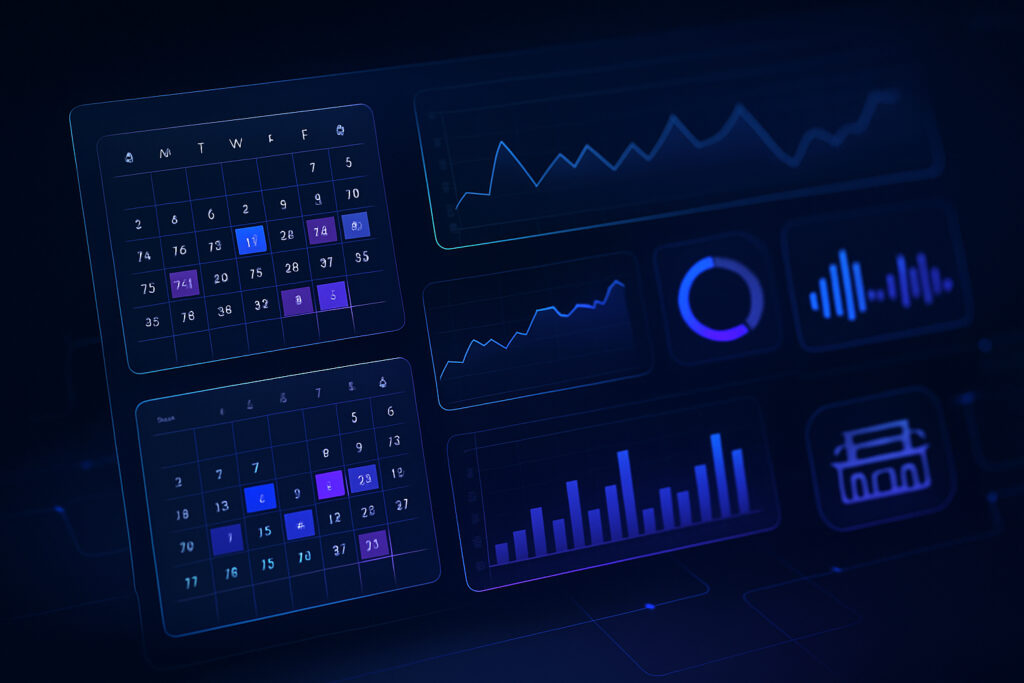
Top 10 Features Every Music Venue Management Software Should Have
The live music industry is experiencing unprecedented growth, with global revenues reaching over $33 billion in 2023, marking a 25% increase from the previous year. This surge in live events has created both opportunities and challenges for venue operators who must manage increasingly complex operations while maintaining profitability. As talent costs now account for approximately 75% to 85% of total ticket sales revenue and venues face mounting pressure to deliver exceptional experiences, the right music venue management software has become essential for success.
Modern venue operators can no longer rely on spreadsheets and manual processes to keep pace with industry demands. The most successful venues are those that leverage comprehensive software solutions to streamline their operations, improve team coordination, and maximize revenue opportunities. Whether you’re managing a small club or a large amphitheater, understanding which features to prioritize in your venue management software can make the difference between thriving and merely surviving in today’s competitive landscape.
#1: Essential Calendar and Scheduling Management
The foundation of effective music venue management software lies in its calendar and scheduling capabilities. Your software should provide an intuitive, centralized calendar that offers complete visibility into all venue activities, from confirmed shows to tentative holds. This isn’t just about basic date tracking—it’s about creating a comprehensive overview that empowers your team to make informed decisions quickly.
Real-Time Calendar Synchronization
The best venue management software platforms offer real-time calendar synchronization that keeps everyone on your team updated instantly. When a booking is confirmed, cancelled, or modified, all team members should see these changes immediately. This feature prevents double bookings, reduces miscommunications, and ensures that your sales team always has accurate availability information when speaking with potential clients.
Multi-Venue and Multi-Room Support
For venues with multiple stages, rooms, or even multiple locations, your software should handle complex scheduling scenarios with ease. Color-coding capabilities help distinguish between different spaces at a glance, while advanced filtering options allow team members to focus on specific venues or room types. This organizational structure becomes invaluable when managing overlapping events or coordinating resources across multiple spaces.
Hold Management and Availability Sharing
Professional venue management software should streamline the process of managing holds and sharing availability with promoters and booking agents. The ability to quickly generate and share availability reports saves countless hours of back-and-forth communication. Advanced platforms even allow trusted partners to place holds directly in your system, speeding up the booking process while maintaining control over your calendar.
#2: Comprehensive Deal and Contract Tracking
Managing deals and contracts manually is a recipe for missed deadlines, lost revenue, and damaged relationships. Your music venue management software should provide robust tools for tracking every aspect of your deals from initial inquiry through final settlement.
Deal Pipeline Management
Effective deal tracking begins with a clear pipeline that shows the status of every potential booking. Your software should categorize deals by stage—from initial inquiry and negotiation to contract execution and settlement. This visibility allows you to prioritize follow-ups, identify bottlenecks in your sales process, and ensure that promising opportunities don’t fall through the cracks.
Contract Generation and Management
The best venue management software platforms include contract generation tools that create professional, detailed agreements based on your negotiated terms. These systems should store templates for different event types while allowing customization for specific requirements. Digital signature capabilities streamline the approval process, while version control ensures everyone is working with the most current contract terms.
Automated Follow-Up and Deadline Tracking
Your software should automatically track important deadlines and trigger reminders for contract signatures, deposits, and other critical milestones. This automation prevents deals from stalling due to forgotten follow-ups and helps maintain momentum throughout the booking process. Advanced systems can even escalate reminders to supervisors when deadlines approach without response.
#3: Financial Management and Reporting Tools
Financial transparency and accurate reporting are crucial for venue profitability. Your venue management software should provide comprehensive financial tools that help you track revenue, manage expenses, and generate detailed reports for stakeholders.
Revenue and Expense Tracking
Professional-grade financial management features allow you to track all revenue streams and expenses associated with each event. This includes ticket sales, bar revenue, merchandise cuts, and operational costs. The software should categorize these financial elements automatically and provide real-time updates on event profitability. Integration with your existing accounting systems eliminates double data entry and ensures consistency across your financial records.
Settlement Generation and Processing
Settlement processing is often one of the most time-consuming and error-prone aspects of venue management. Quality software should generate accurate settlement sheets automatically based on your original agreements, actual attendance figures, and ancillary revenue. These systems should handle complex calculations including guarantees, percentage splits, and various deductions while maintaining complete transparency for all parties involved.
Financial Reporting and Analytics
Robust reporting capabilities provide insights that drive better business decisions. Your software should generate customizable reports showing performance by artist, genre, time period, or venue space. Advanced analytics might reveal trends in attendance patterns, optimal pricing strategies, or seasonal variations in revenue. These insights become invaluable for strategic planning and marketing efforts.
#4: Team Collaboration and Task Management
Running a successful venue requires coordination among multiple team members, each with different roles and responsibilities. Your music venue management software should facilitate seamless collaboration while maintaining appropriate access controls.
Role-Based Permissions and Access Control
Not every team member needs access to every piece of information. Professional venue management software includes robust permission systems that allow you to customize what each user can see and edit. Box office staff might need access to ticket sales data but not financial settlements, while promoters might see event details but not internal cost information. This granular control protects sensitive information while ensuring everyone has the data they need to do their jobs effectively.
Task Assignment and Progress Tracking
Effective task management features help ensure that nothing falls through the cracks as events approach. Your software should allow you to create task templates for different event types, assign responsibilities to specific team members, and track progress in real-time. Automated reminders and deadline notifications keep everyone accountable while reducing the administrative burden on managers.
Communication and Documentation Tools
Centralized communication tools keep all event-related discussions in one place. Rather than hunting through email threads or Slack channels, team members should be able to see complete communication histories associated with specific events or artists. Document storage capabilities ensure that contracts, riders, and other important files are easily accessible to authorized team members.
#5: Artist and Contact Management
Your venue’s success depends on maintaining strong relationships with artists, managers, agents, and other industry professionals. Comprehensive contact management features help you nurture these relationships and leverage them for future bookings.
Comprehensive Contact Database
A professional contact management system goes beyond basic name and phone number storage. Your software should track roles, preferences, past event history, and performance metrics for each contact. This information becomes invaluable when planning future events or making booking decisions. Advanced systems might even track which contacts have the best track record for successful events at your venue.
Relationship History and Communication Tracking
Every interaction with industry contacts should be documented and easily accessible. When an agent calls about availability, your team should be able to quickly see past events with that agent, payment history, and any special requirements or preferences. This information helps build stronger relationships and makes future negotiations more efficient.
Artist Performance Analytics
Data-driven booking decisions require comprehensive performance tracking. Your software should analyze attendance figures, revenue generation, and audience demographics for each artist who has performed at your venue. This information helps you make informed decisions about guarantees, ticket pricing, and marketing investments for future shows.
#6: Payment Processing and Financial Controls
Managing payments across multiple events, vendors, and revenue streams requires sophisticated financial controls. Your venue management software should streamline payment processing while maintaining complete transparency and audit trails.
Automated Payment Tracking
Manual payment tracking leads to errors and oversights that can damage business relationships. Professional software automatically tracks deposits, guarantee payments, percentage splits, and vendor payments. The system should send automated reminders for overdue payments and provide clear visibility into outstanding amounts. Integration with banking systems can further streamline reconciliation processes.
Multi-Currency and Tax Management
For venues that host international acts or operate across different tax jurisdictions, currency and tax management features become essential. Your software should handle currency conversions, tax calculations, and compliance reporting automatically. This reduces the administrative burden on your accounting team while ensuring accuracy in financial reporting.
Audit Trails and Compliance Reporting
Financial transparency requires comprehensive audit trails that document every transaction and change. Your venue management software should maintain detailed logs of who made changes, when they were made, and what the previous values were. This information is crucial for internal controls, external audits, and regulatory compliance.
#7: Integration Capabilities and Data Management
Modern venues use multiple software systems for different aspects of their operations. Your venue management software should integrate seamlessly with these existing systems to create a unified operational environment.
Ticketing System Integration
Real-time integration with ticketing platforms provides immediate visibility into sales performance. Your venue management software should display current ticket sales figures, seating availability, and revenue projections directly within event records. This integration eliminates the need to log into multiple systems and ensures that all team members have access to current sales data when making operational decisions.
Accounting and Financial System Connectivity
Seamless integration with your existing accounting software eliminates double data entry and reduces the risk of financial discrepancies. Your venue management platform should automatically sync revenue figures, expense data, and payment information with your general ledger. This integration streamlines month-end closing processes and ensures consistency across all financial reporting.
Marketing and CRM Platform Alignment
Effective marketing requires coordination between your venue management system and marketing platforms. Integration capabilities should allow for automatic audience segmentation based on past attendance, synchronized email campaigns tied to specific events, and performance tracking across marketing channels. This coordination maximizes the effectiveness of your marketing investments while reducing manual work.
#8: Mobile Accessibility and Remote Management
The music industry operates around the clock, and venue managers need access to critical information regardless of their location. Your venue management software should provide full functionality through mobile applications and web-based interfaces.
Mobile-Responsive Design
A truly mobile-friendly venue management system offers more than just basic information access. Team members should be able to check availability, update event details, process settlements, and communicate with colleagues from their mobile devices. The interface should be optimized for touch interaction while maintaining the full functionality of the desktop version.
Offline Functionality and Data Synchronization
Venues often deal with inconsistent internet connectivity, especially during load-in and setup periods. Your software should provide offline functionality for critical features like schedule access, contact information, and basic data entry. When connectivity returns, the system should automatically synchronize any changes made offline with the central database.
Remote Team Coordination
Modern venue operations often involve remote team members, traveling managers, and distributed decision-making. Your software should support real-time collaboration regardless of team members’ physical locations. This includes shared access to schedules, coordinated task management, and synchronized communication tools that keep everyone informed about important developments.
#9: Advanced Analytics and Business Intelligence
Data-driven decision making separates successful venues from those that struggle to maintain profitability. Your venue management software should provide sophisticated analytics that reveal patterns, trends, and opportunities for improvement.
Performance Metrics and KPI Tracking
Comprehensive analytics should track key performance indicators across all aspects of your venue operations. This includes attendance trends, revenue per event, customer acquisition costs, and operational efficiency metrics. The software should present this information through intuitive dashboards that make it easy to spot trends and identify areas for improvement.
Predictive Analytics and Forecasting
Advanced analytics capabilities use historical data to predict future performance and identify opportunities. Your software might analyze past attendance patterns to suggest optimal pricing strategies, or use seasonal trends to recommend booking strategies for different times of the year. These insights help venue managers make proactive decisions rather than simply reacting to current conditions.
Custom Reporting and Data Export
Different stakeholders require different types of information presented in various formats. Your venue management software should offer flexible reporting tools that allow you to create custom reports for specific needs. Whether you’re preparing board presentations, analyzing marketing campaign effectiveness, or providing artist performance summaries, the system should make it easy to generate professional, informative reports.
#10: Security and Data Protection
Venue management systems handle sensitive financial information, personal data, and confidential business details. Robust security features protect this information while ensuring compliance with relevant regulations.
Data Encryption and Secure Access
Professional-grade security begins with comprehensive data encryption both in transit and at rest. Your venue management software should use industry-standard encryption protocols to protect sensitive information. Multi-factor authentication adds an additional layer of security, ensuring that only authorized users can access the system even if login credentials are compromised.
Regular Backups and Disaster Recovery
Data loss can be catastrophic for venue operations. Your software should include automated backup systems that regularly save all critical information to secure, geographically distributed locations. Disaster recovery procedures should ensure that you can quickly restore operations even in the event of major system failures or security incidents.
Compliance and Audit Support
Depending on your location and business structure, your venue might be subject to various regulatory requirements regarding data protection, financial reporting, or employment law. Your venue management software should include features that support compliance with relevant regulations. This might include data retention policies, privacy controls, or specialized reporting capabilities that meet regulatory requirements.
Choosing the Right Music Venue Management Software
The music venue industry continues to evolve rapidly, with industry projections suggesting continued growth toward $50 billion by 2030. Success in this competitive environment requires more than just great programming and marketing—it demands operational excellence supported by robust technology solutions. The ten features outlined above represent the foundation of effective venue management software that can help you streamline operations, improve profitability, and deliver exceptional experiences for both artists and audiences.
When evaluating venue management software options, remember that the best solution is one that integrates seamlessly with your existing workflows while providing room for growth. The right platform should feel intuitive to your team, scale with your business, and provide the insights you need to make informed decisions about your venue’s future.Are you ready to transform your venue operations with professional-grade management software? Prism offers a comprehensive solution designed specifically for music industry professionals, featuring all the essential features discussed above and more. Built by industry experts who understand the unique challenges of venue management, Prism can help you streamline your booking process and maximize your operational efficiency. Contact us today to book a demo and see how Prism can help your venue thrive in today’s competitive music industry.

Matt Ford is the founder and CEO of Prism.fm, an Austin-based software company revolutionizing live music event management. With a background in entrepreneurship and a degree from the University of Wisconsin-Madison School of Business, Ford combined his self-taught coding skills with firsthand experience as a concert promoter to address the inefficiencies he observed in the industry. In 2018, he launched Prism.fm, an all-in-one platform designed to streamline operations for venues, promoters, and agencies by replacing cumbersome spreadsheets with integrated tools for booking, financial tracking, and contract management. Under his leadership, Prism.fm has grown significantly, achieving $3 million in annual recurring revenue post-COVID and securing over $15 million in funding . Ford’s commitment to building user-centric solutions has positioned Prism.fm as a trusted partner for over 1,500 venues and promoters worldwide.



